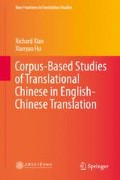Abstract
In this final chapter, we will make some conclusive remarks about our research carried out during the past few years. First of all, based on all the distinct linguistic features of translational Chinese as discussed and analysed throughout the book, we will try to re-evaluate the translation universals hypotheses from the Chinese perspective. Evidence and counterevidence for explicitation, simplification, source language shining through, under-representation of TL unique items, convergence and normalisation will be considered altogether for a more comprehensive picture of translational Chinese as one of the “Third Codes”. We will then reflect on the major contributions of our research to the studies of translation universals and to descriptive translation studies in general and finally close the discussions by exploring some potentially fruitful avenues for future research in this area.
Access this chapter
Tax calculation will be finalised at checkout
Purchases are for personal use only
References
Baker, M. (1993). Corpus linguistics and translation studies: Implications and applications. In M. Baker, G. Francis, & E. Tognini-Bonelli (Eds.), Text and technology: In honor of John Sinclair (pp. 233–250). Amsterdam: John Benjamins.
Baker, M. (1996). Corpus-based translation studies: The challenges that lie ahead. In H. Somers (Ed.), Terminology, LSP and translation: Studies in language engineering in honour of Juan C. Sager (pp. 175–186). Amsterdam: John Benjamins.
Baker, M. (2007). Patterns of idiomaticity in translated vs. non-translated text. Belgian Journal of Linguistics, 21, 11–21.
Biber, D. (1988). Variations across speech and writing. Cambridge: Cambridge University Press.
Biber, D. (1995). Dimensions of register variation: A cross-linguistic comparison. Cambridge: Cambridge University Press.
Mauranen, A., & Kujamäki, P. (2004). Translation universals: Do they exist? Amsterdam: John Benjamins.
McEnery, A., & Xiao, R. (2002). Domains, text types, aspect marking and English-Chinese translation. Languages in Contrast, 2(2), 211–231.
Teich, E. (2003). Cross-linguistic variation in system and text: A methodology for the investigation of translations and comparable texts. Berlin: Mouton de Gruyter.
Toury, G. (1995). Descriptive translation studies and beyond. Amsterdam: John Benjamins.
Xiao, R. (2009a). Multidimensional analysis and the study of world Englishes. World Englishes, 28(4), 421–450.
Xiao, R. (2010a). Using corpora in contrastive and translation studies. Newcastle: Cambridge Scholars Publishing.
Xiao, R. (2010b). How different is translated Chinese from native Chinese. International Journal of Corpus Linguistics, 15(1), 5–35.
Xiao, R. (2010c). Corpus creation. In N. Indurkhya & F. Damerau (Eds.), The handbook of natural language processing (2nd ed., pp. 147–165). London: CRC Press.
Xiao, R. (2011). Word clusters and reformulation markers in Chinese and English: Implications for translation universal hypotheses. Languages in Contrast, 11(1), 145–171.
Xiao, R., & McEnery, A. (2010). Corpus-based contrastive studies of English and Chinese. London: Routledge.
Hu, K. (2011). Yuliaoku fanyi xue gailun [Corpus-based translation studies]. Shanghai: Shanghai Jiao Tong University Press.
Wang, K. (2005). Fanyi zhong de yin he xian [The explicitation and implicitation in translation]. Waiyu jiaoxue yu yanjiu [Foreign Language Teaching and Research] (4) 37.
Wang, K. (2011). Yuliaoku fanyi xue tansuo [Exploring corpus-based translation studies]. Shanghai: Shanghai Jiao Tong University Press.
Xiao, Z., & Dai, G. (2010a). Xunqiu “ disan yu ma ”: jiyu hanyu yiwen yuliaoku de fanyi gongxing yanjiu [In pursuit of the “Third Code”: A study of translation universals based on the ZCTC corpus of translational Chinese]. Waiyu jiaoxue yu yanjiu [Foreign Language Teaching and Research] 42(1): 52–58.
Xiao, Z., & Dai, G. (2010b). Yuliaoku zai yuyan jiaoxue zhong de yunyong —— zhongguo yingyu xuexizhe beidong jushi xi de gean yanjiu [Using corpora in language pedagogy: a case study of passive constructions in Chinese learner English]. Zhejiang daxue xuebao (renwen shehuikexue ban) [Journal of Zhejiang University (Humanities and Social Sciences) ] 40(4): 189–200.
Xiao, Z., & Dai, G. (2010c). Hanyu yi wenzhong xi yu yu ci cu de shiyong tezheng: jiyu yuliaoku de yanjiu [A corpus-based study of idioms and word clusters in translated Chinese]. Waiyu yanjiu [Foreign Languages Research] 121(3): 79–86.
Author information
Authors and Affiliations
Rights and permissions
Copyright information
© 2015 Shanghai Jiao Tong University Press and Springer-Verlag Berlin Heidelberg
About this chapter
Cite this chapter
Xiao, R., Hu, X. (2015). Conclusive Remarks. In: Corpus-Based Studies of Translational Chinese in English-Chinese Translation. New Frontiers in Translation Studies. Springer, Berlin, Heidelberg. https://doi.org/10.1007/978-3-642-41363-6_9
Download citation
DOI: https://doi.org/10.1007/978-3-642-41363-6_9
Publisher Name: Springer, Berlin, Heidelberg
Print ISBN: 978-3-642-41362-9
Online ISBN: 978-3-642-41363-6
eBook Packages: Humanities, Social Sciences and LawSocial Sciences (R0)

